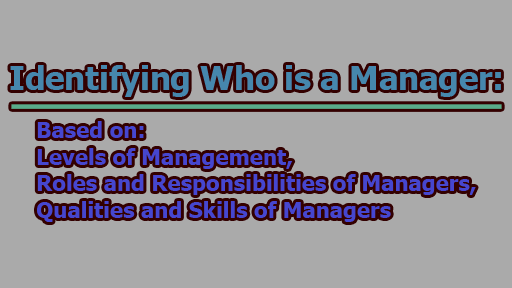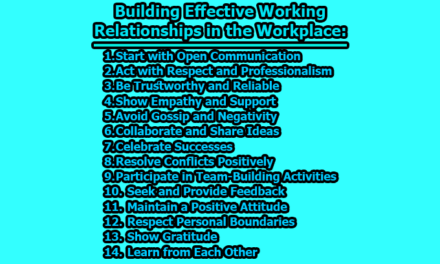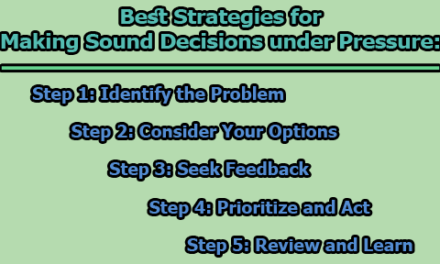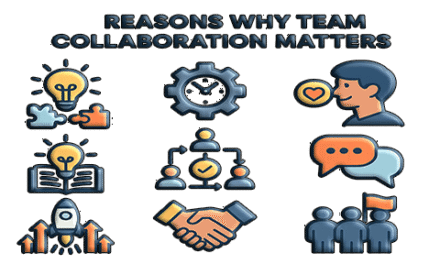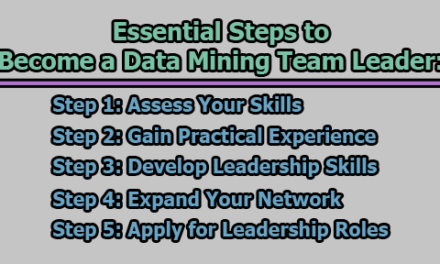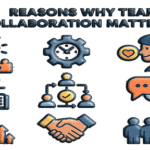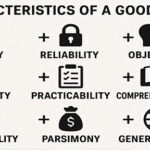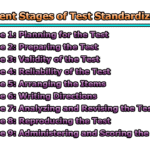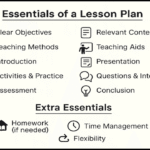Identifying Who is a Manager:
Managers are integral components of any organization’s structure and are responsible for steering the organization towards its goals and objectives. They hold a critical role in coordinating resources, overseeing activities, making decisions, and providing leadership. Managers exist at various levels within an organization’s hierarchy, and their roles and responsibilities differ based on their level, area of expertise, and the organization’s size and nature. In the rest of the article, we are going to know about “Identifying Who is a Manager” based on levels of management, roles and responsibilities of managers, qualities and skills of managers.
Levels of Management:
A. Top-Level Managers (Executives): These are the senior-most managers in an organization, occupying positions such as Chief Executive Officer (CEO), Chief Operating Officer (COO), Chief Financial Officer (CFO), and Chief Information Officer (CIO). Top-level managers are responsible for crafting the organization’s overall strategy, defining its mission and vision, and setting long-term goals. They focus on external relations, such as forming partnerships, alliances, and collaborations. These executives are accountable to the board of directors or stakeholders and make pivotal decisions that shape the organization’s direction.
B. Middle-Level Managers (Department Heads, Division Managers): Middle managers operate between the top-level executives and front-line managers. They lead specific departments, divisions, or functional areas, such as Sales, Marketing, Human Resources, or Operations. Their responsibilities include translating the organization’s strategic goals into actionable plans, developing departmental budgets, and aligning their teams’ efforts with the broader organizational objectives. Middle managers are often responsible for managing and coordinating the work of front-line employees and ensuring effective communication between various levels of the organization.
C. Front-Line Managers (Supervisors, Team Leaders): Front-line managers are directly engaged with the operational aspects of the organization. They oversee teams of employees who perform tasks related to the organization’s core activities. Examples include production supervisors, shift managers, and team leaders. Front-line managers focus on day-to-day operations, ensuring that tasks are completed efficiently, quality standards are met, and employees are motivated. They play a crucial role in maintaining a productive and harmonious work environment.
Roles and Responsibilities of Managers:
1. Decision-Making: One of the primary roles of managers is decision-making. They analyze available information, evaluate alternatives, and make choices that impact the organization. These decisions range from high-level strategic choices to routine operational matters. Effective decision-making involves considering both short-term and long-term implications for the organization.
2. Planning: Managers engage in the planning process, which involves setting goals, determining the actions required to achieve those goals, and outlining the resources needed. They consider internal and external factors, market trends, and the competitive landscape while devising comprehensive plans that guide the organization’s activities.
3. Organizing: Managers organize resources to ensure the efficient execution of plans. This includes structuring tasks, allocating personnel, coordinating activities, and arranging necessary equipment and materials. Organizing involves designing an organizational structure that facilitates communication, collaboration, and effective resource utilization.
4. Leading: Leadership is a cornerstone of effective management. Managers provide guidance, motivation, and direction to their teams. They set expectations, establish a positive work culture, and inspire employees to perform at their best. Leading also involves coaching, mentoring, and addressing performance issues to enhance employee growth and development.
5. Controlling: Managers monitor and evaluate performance to ensure that it aligns with established standards and plans. They set performance metrics, measure actual performance, compare the two, and take corrective actions if deviations occur. Controlling aims to maintain consistency and efficiency in achieving organizational goals.
6. Communication: Effective communication is a critical skill for managers. They must convey information, expectations, and changes clearly to their teams. Additionally, they facilitate open communication channels, actively listen to feedback, and address concerns or issues raised by employees.
7. Problem-Solving: Managers are tasked with identifying challenges and finding viable solutions. They analyze complex situations, gather relevant information, and engage in critical thinking to overcome obstacles and make informed choices that benefit the organization.
8. Human Resource Management: Managers are responsible for overseeing the workforce. This includes hiring the right talent, conducting training and development programs, conducting performance evaluations, and addressing personnel issues. Creating a positive work environment and ensuring employee engagement are key aspects of effective human resource management.
9. Change Management: Organizations constantly face changes, whether due to technological advancements, market shifts, or internal adjustments. Managers play a crucial role in guiding their teams through these changes, minimizing resistance, and ensuring a smooth transition.
10. Innovation: Managers encourage innovation by fostering a culture that promotes creativity and idea-sharing. They identify opportunities for process improvements, product development, and efficiency enhancements.
Qualities and Skills of Managers:
i. Leadership: Effective managers exhibit strong leadership qualities, inspiring trust, respect, and confidence among their teams. They lead by example and set the tone for their organization’s culture.
ii. Communication: Good communication skills enable managers to articulate their vision, expectations, and goals clearly. They listen actively, encourage open dialogue, and ensure that information flows seamlessly within the organization.
iii. Problem-Solving: Managers encounter diverse challenges that require them to analyze situations, identify root causes, and develop innovative solutions. Problem-solving skills allow them to navigate complexities effectively.
iv. Decision-Making: Managers make decisions under varying levels of uncertainty. They gather information, assess risks, and make well-informed choices aligned with the organization’s goals.
v. Time Management: Efficient managers prioritize tasks, manage their time, and allocate resources effectively to achieve optimal results.
vi. Adaptability: The business landscape is dynamic, and managers need to adapt to changes in technology, industry trends, and market shifts. Flexibility and openness to change are crucial qualities.
vii. Conflict Resolution: Conflicts are inevitable in any organization. Managers adept at conflict resolution address issues promptly, promote healthy communication, and find solutions that preserve relationships and productivity.
viii. Strategic Thinking: Managers with strategic thinking skills align their decisions with the organization’s long-term goals. They understand how their actions contribute to the bigger picture.
ix. Team Building: Building cohesive and high-performing teams requires managers to understand team dynamics, nurture collaboration, and leverage each team member’s strengths.
x. Technical Expertise: Depending on the industry, managers may need technical expertise related to their field. This expertise enables them to make informed decisions and provide guidance to their teams.
In conclusion, managers are pivotal to an organization’s success. They operate at various levels within the organizational hierarchy, playing roles that encompass decision-making, planning, organizing, leading, controlling, and more. Effective managers possess a combination of qualities and skills that allow them to navigate the complexities of the modern business landscape and guide their teams toward achieving organizational objectives.
Frequently Asked Questions (FAQs):
What is the role of a manager in an organization?
A manager is responsible for overseeing various aspects of an organization, including planning, organizing, leading, and controlling resources to achieve organizational goals. They make decisions, provide direction, and ensure effective coordination among team members to drive the organization’s success.
What are the different levels of managers within an organization?
Managers exist at three primary levels: top-level managers (executives), middle-level managers (department heads), and front-line managers (supervisors). Top-level managers focus on strategic decision-making, middle-level managers bridge the gap between top-level and front-line managers, and front-line managers oversee day-to-day operations.
What distinguishes top-level managers from middle-level and front-line managers?
Top-level managers are responsible for setting the organization’s strategic direction, making high-stakes decisions, and representing the organization to external stakeholders. Middle-level managers translate strategic goals into actionable plans for their departments, while front-line managers oversee and guide employees directly involved in operational tasks.
What skills are crucial for effective managers?
Effective managers require a combination of skills, including leadership, communication, problem-solving, decision-making, time management, adaptability, conflict resolution, and strategic thinking. These skills enable managers to guide teams, address challenges, and make informed decisions.
How do managers contribute to organizational success?
Managers play a pivotal role in achieving organizational success by aligning resources and efforts with strategic goals. They provide guidance, make decisions that drive efficiency, foster employee engagement, and adapt to changes in the business environment to ensure the organization’s competitiveness.
What is the significance of communication for managers?
Communication is essential for managers to convey expectations, goals, changes, and feedback to their teams. Effective communication promotes understanding, collaboration, and a positive work environment, leading to increased productivity and employee satisfaction.
How do managers handle conflicts within teams?
Managers use conflict resolution skills to address disagreements within teams. They encourage open communication, identify underlying issues, facilitate discussions, and work towards finding solutions that maintain positive relationships and productivity.
Can someone be a manager without formal authority?
Yes, informal leaders within a team or organization can exhibit managerial qualities without formal authority. They might influence their peers, guide initiatives, and play a leadership role despite not holding an official managerial position.
How do managers adapt to changes in the business environment?
Managers need to be adaptable and open to change. They stay informed about industry trends, technological advancements, and shifts in the market. By fostering a culture of innovation and being flexible in their approaches, managers help their organizations thrive in dynamic environments.
What role do managers play in employee development?
Managers are responsible for nurturing their team members’ growth. They provide training, mentorship, and opportunities for skill development. Managers also conduct performance evaluations and provide feedback to help employees improve and advance in their careers.
What distinguishes a successful manager from an average one?
Successful managers demonstrate strong leadership qualities, effective communication, strategic thinking, adaptability, and the ability to motivate and empower their teams. They consistently achieve results, foster a positive work culture, and contribute significantly to the organization’s growth.
Can the qualities of a good manager be learned and developed?
Yes, many qualities of effective managers can be learned and developed through education, training, and practical experience. Leadership programs, workshops, mentorship, and continuous self-improvement efforts can enhance managerial skills over time.
How do managers balance their various roles and responsibilities?
Balancing managerial roles requires effective time management, prioritization, and delegation. Managers set clear priorities, delegate tasks appropriately, and use tools and strategies to manage their time efficiently.
What impact does a manager’s leadership style have on their team?
A manager’s leadership style affects team dynamics, motivation, and performance. Different styles, such as authoritarian, democratic, or transformational, influence how team members interact, contribute, and collaborate.
Can a manager be effective without being liked by their team?
While being liked by the team can enhance a manager’s influence, effectiveness is not solely dependent on popularity. A manager who demonstrates fairness, competence, and consistency in their decisions and actions can still be effective, even if they’re not universally liked.

Assistant Teacher at Zinzira Pir Mohammad Pilot School and College

